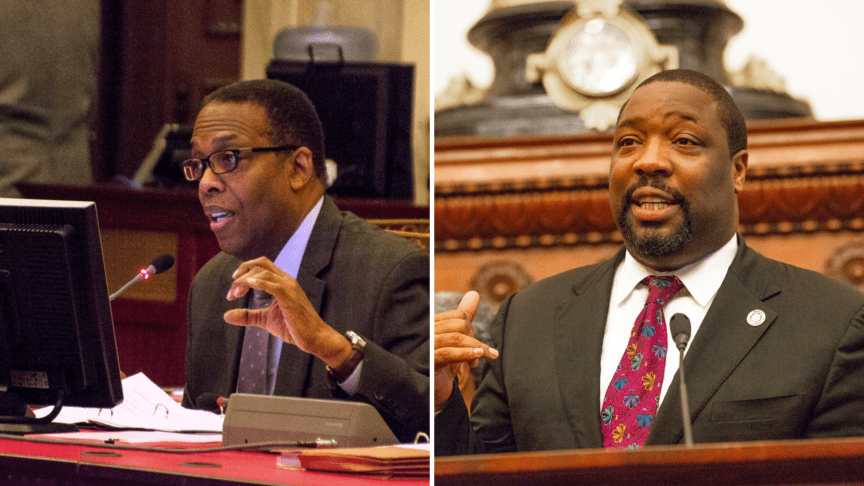Philadelphia, Dec. 6, 2018 – City Council President Darrell L. Clarke (5th District) and Councilmember Kenyatta Johnson (2nd District) on Thursday put forth a bill to spur bureaucratic reforms to streamline and improve the public land disposition process in Philadelphia.
Five years after creation of the Philadelphia Land Bank and three years after Council’s move to consolidate planning and development functions into one Cabinet-level department, district representatives, property developers, and affordable housing advocates have been frustrated by the slow pace of increased efficiencies of public land disposition in service to Council’s goal of equitable growth and safe, quality housing for everyone.
“The City of Philadelphia is in the enviable position of managing growth, but with that comes great responsibility to ensure that every resident – young and old, lifelong and newcomer, wealthy and poor – benefits from our growth in a fair and equitable way,” Council President Clarke said. “We are sympathetic to the argument that dramatic reform of outdated bureaucracies takes time, and are appreciative of the hard work City employees and Department of Planning and Development leaders put in every day. But, too many things are still going wrong. The reforms I propose today will further Council’s goals of accurate appraisals, accurate record-keeping, and accountability for how developers present themselves to the City.”
The bill amending Chapter 16-400 of The Philadelphia Code accomplishes the following:
- Installs the Philadelphia Land Bank as a member of the Vacant Property Review Committee (VPRC)
- Mandates review of VPRC appraisal for properties subject to VPRC’s jurisdiction
- Requires VPRC to inspect all properties at the end of each completion period to examine and enforce compliance with rehabilitation and/or improvement provisions, and to discourage speculation and flipping
- Prohibits further conveyance of purchased property within the redevelopment completion period without written permission from VPRC and the Public Property Commissioner
- Designates the Law Department as the agency responsible for enforcing the irrevocable Power of Attorney to retake possession of the property in the event of noncompliance by the purchaser
- Requires VPRC to establish written policies and procedures for property disposition
- Increases the completion period for rehabilitation and/or improvement of property from one year to 18 months in an effort to make redevelopment opportunities accessible to small or new developers, community organizations, nonprofits, and residents
“These amendments will add additional layers of accountability to the land disposition process, from start to finish,” Councilmember Johnson added. “It also puts developers who seek to game the system for financial advantage on notice: If you misrepresent your capabilities or intentions when purchasing public land, the City of Philadelphia will exercise its authority to claw back your property for higher and better use. In fairness to our communities and to those who genuinely wish to help Philly grow equitably, this is simply the right thing to do.”
Also on Thursday, Council President Clarke put forth a resolution authorizing the Committee of the Whole to conduct public hearings on the condition of Philadelphia’s aging infrastructure.
According to the Pennsylvania State Council of the American Society of Civil Engineers (ASCE), half of the City’s water mains date back to before 1930, and nearly 30 percent of mains were installed before 1900. According to a Pennsylvania ASCE report, the City experiences on average 750 water main breaks per year, or slightly more than two per day.
“These water main breaks are disruptive to neighborhoods, costly to address, and put vulnerable residents such as children and the elderly in harm’s way,” Council President Clarke said. “It is simply unfair that a senior citizen must live with two feet of water in her basement and no clean running water simply because the City is not able to address infrastructure breakdowns at a reasonable pace. I want to thank the Water and Streets departments for being responsive to my concerns, and for walking me through several problem areas in my district recently. This isn’t just a 5th District problem; this is a Philadelphia problem. I look forward to a productive discussion about how best we should prioritize and address our infrastructure maintenance needs.”
The ordinance and resolution are listed below.
120618 CPC Committee of the Whole Infrastructure Resolution
# # #


